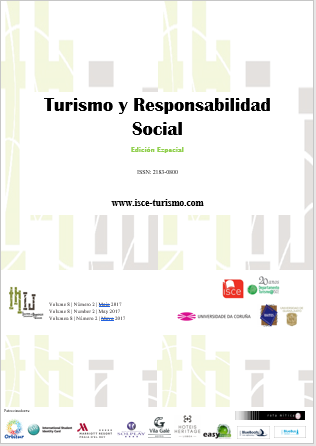Challenges of globalisation: Impact and strategies for action from the Nekatur agrotourism network in the Basque Country.
DOI:
https://doi.org/10.57883/thij8(2)2017.30365Keywords:
Tourism, Agrotourism, Globalization, EuskadiAbstract
With the phenomenon of globalization in the twentieth century an extension and diffusion of mass tourism are produced. It is an intensive and localized tourist modality that brings important social and environmental effects. As an alternative to this standardized model, other more specialized tourism, based on nature, culture and heritage, are characterized by the variety, flexibility and permeability of their forms. The network formed by the association "Nekazalturismoa-landaturismoa" (Nekatur) can be an alternative tourist modality to mass tourism and, thanks to the potential of globalization, can favor its development. The objective of this article is to show how this tourist modality can become an alternative to mass tourism, adapted, specialized and arranged according to the tastes and needs of travelers.
References
Aramberri, J. (2014). Turismo de masas y modernidad: Un enfoque sociológico. CIS - Centro de Investigaciones Sociológicas.
Bardón Fernández, E. (1990). Consideraciones sobre el turismo rural en España y medidas de desarrollo. Estudios Turísticos, 108, 61-82.
Blanco Portillo, R., Benayas del Alamo, J. (1994). El turismo como motor del desarrollo rural. Análisis de los proyectos de turismo subvencionados por Leader I. Revista de Estudios Agrosociales, 49 (169), 119-147.
Blas de, X. P. & Fabeiro, C. P. (2004). La planificación turística sostenible: un análisis aplicado al municipio de Caldas de Reis. Revista galega de economía: Publicación Interdisciplinar da Facultade de Ciencias Económicas e Empresariais, 13(1), 157-174.
Bolívar, A. (2001). Globalización e identidades: (Des)territorialización de la cultura. Revista de Educación. (número extraordinario), 265-288.
Cohen, E. (1979). Rethinking the sociology of tourism. Annals of tourism research, 6(1), 18-35.
Dann, G. & Cohen, E. (1991). Sociology and tourism. Annals of tourism research, 18(1), 155-169.
Díaz Ameneiro, P. (2015). Pateando el litoral: la construcción del territorio del turismo de masas (Tesis doctoral), Universitat Politècnica de Catalunya, Barcelona.
Estrada González, A. C. & González, A. R. (2015). La gestión del turismo comunitario versus desarrollo del turismo de masas en la región de Bahía de Banderas, Nayarit, México. Revista Turismo y Desarrollo Local, 8(19).
Gaviria, M. (1974). España a Go-go: Turismo charter y neocolinialismo del espacio. Ediciones Turner.
Gilbert, D. C. (1992). Perspectivas de desarrollo del turismo rural. Revista Valenciana d’Estudis Autonòmics, 13, 167-193.
Gordon, B. M. (2012). El turismo de masas: Un concepto problemático en la historia del siglo XX., Historia contemporánea, 25, 125-156.
Martínez Quintana, M. V. (2006). Ocio y turismo en la sociedad actual: Los viajes, el tiempo libre y el entretenimiento en el mundo globalizado. Madrid: McGraw Hill.
Mathieson, A. & Wall, G. (1982). Tourism, economic, physical and social impacts. London: Longman.
Miller, M. L. & Auyong, J. (1998). Remarks on tourism terminologies: Anti-Tourism, mass tourism and alternative tourism (pp.1-24). In M. L. Miller & J. Auyong (eds.), Proceedings of the 1996 World Congress on Coastal and Marine Tourism. Seattle, WA: University of Washington.
Murillo Bonvehí, D. (2015). From Walmart to Al Qaeda: An interdisciplinary approach to globalization. Sheffield: Greenfield Publ.
Pearce, D. G. (1992). Alternative tourism: concepts, classifications, and questions (pp.15-30). In V. L. Smith & W. R. Eadington (eds.) Tourism Alternatives. Philadelphia, PA: University of Pennsylvania Press.
Poon, A. (1993). Tourism, technology and competitive strategies. Oxon: CABI.
Rábago, N. L. B. & Revah, L. O. (2000). El ecoturismo: ¿Una nueva modalidad del turismo de masas? Economía, Sociedad y Territorio, 2(7), 373-403.
Robertson, R. (2002). Glocalization: Time-space and homogeneity-heterogeneity (pp. 25-45). In R. Robertson, S. Lash, S. & M. Featherstone (eds.). Global modernities. London: Sage Publications.
Rudra, N. (2008). Globalization and the race to the bottom in developing countries: Who really gets hurt? Cambridge Cambridge University Press.
Salvà Tomàs, P. A. (1998). Los modelos de desarrollo turístico en el Mediterráneo. Cuadernos de turismo (2), 7-24.
Sancho, A. & Buhalis, D. (1998). Introducción al turismo. Madrid: Organización Mundial del Turismo.
Serrano, L. M. & Molina, M. A. V. (2002). Análisis del concepto de turismo rural e implicaciones de marketing. Boletín económico de ICE, Información Comercial Española, (2741), 25-36.
Soro, S. (2016). Boom imparable: Més de mil milions de turistes a l’any... i pujant, ARA, 15/05/2016.
Torres, R. (2002). Cancun’s tourism development from a fordist spectrum of analysis. Tourist Studies, 2(1), 87-116.
Vainikka, V. (2013). Rethinking mass tourism. Tourist Studies, 13(3), 268-286.
World Tourism Organization (1996). What tourism managers need to know: A practical guide to the development and use of indicators of sustainable tourism? Madrid: World Tourism Organization.
Downloads
Published
How to Cite
Issue
Section
License
Copyright (c) 2017 This work is licensed under a Creative Commons - Attribution 4.0 International (CC BY 4.0)

This work is licensed under a Creative Commons Attribution 4.0 International License.
This work is published under the Creative Commons Attribution 4.0 International License.






